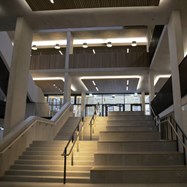Global research-intensive universities issue joint call for collaboration on shared challenges
01 July 2024
At a meeting of the Global Research-Intensive Universities Network (GRIUN) in Berlin, representatives of leading research-intensive universities from around the world agreed to reaffirm the principles of the network – the pursuit of free and open enquiry to advance and disseminate knowledge – and called on global governments to work with the international university sector to realise the full potential of its unique research, innovation and partnership opportunities.
Dr Tim Bradshaw, Chief Executive of the Russell Group, joined international colleagues to highlight the importance of collaboration in tackling shared global challenges.
The following GRIUN statement has today been issued collectively by the Russell Group, the American Association of Universities, German U15, Group of Eight (Australia), League of European Research Universities (LERU), RU11 (Japan) and the U15 Group of Canadian Research Universities.

Global Research-Intensive Universities Network (GRIUN): Berlin Statement, June 2024
Our groups represent many of the world’s leading research-intensive universities. These universities share a long, trusting and highly productive history of cooperation, collaboration, and engagement between themselves and with a wide range of other universities, businesses, public and third-sector partners around the world.
We have stood the test of time – with roots stretching back, in some cases, centuries – by serving and supporting our societies through times of conflict, challenge, pandemics, and revolutionary new ideas. We have done this by standing fast to the principles of free and open inquiry: advancing and disseminating knowledge, testing ‘known’ ideas, and undertaking rigorous, evidence-based research.
Our universities are custodians of free speech, even if this is not always a comfortable space to inhabit, particularly at the contested boundaries of ideas or where new thinking disrupts existing paradigms. However, the search for truth is incompatible with closed minds and closed campuses.
Recent years have seen rising geopolitical tensions, a global pandemic, mass migrations, clear evidence of climate change, and greater polarisation as both opinion and rhetoric pushes more towards the extremes. All of this is occurring in a context of rising technologies such as automation and AI, that may replace and reshape many current industries and societies in ways we don’t yet fully understand.
These are global challenges emerging around the globe that require global efforts and global leadership to address, even if their immediate impacts may be more regional or local. Our research-intensive universities play a key role in this endeavor, bringing our expertise and resources together with the goal of creating the capacity for effective global cooperation.
Now more than ever, the responsibility is also on our universities to prepare the next generation with the knowledge and tools for research and innovation, the skills to ‘disagree well’, and the purpose to turn new ideas into sustainable economic growth and social purpose.
As the world confronts increasing challenges, our universities are working relentlessly to develop solutions. As knowledge advances, they are striving hard to create new opportunities.
On the occasion of our meeting in Berlin, we reaffirm the principles upon which we stand and continuously strive for. We call upon Governments around the world to work with us and our partners to ensure we can realise the full potential of the distinctive research, innovation, and partnerships our universities offer.
Societal impact through higher education
Providing outstanding higher education is central to the mission of research-intensive universities. We have a responsibility to young people during their formative years to give them the education and tools they need to make considered, appropriate choices so they contribute positively to the society in which they live. By offering not only the best disciplinary and interdisciplinary knowledge but similarly expertise in critical thinking and rational debate, our institutions aim to empower our students to become the future leaders and innovators our societies need. This is particularly relevant as we look to a future where the emergence of Artificial General Intelligence could be as transformative as the Industrial Revolution.
Innovation through research
Research in all of its forms is front and centre in solving local and global problems and achieving human progress. It serves as the foundation for pioneering technologies and solutions and is laying the groundwork for the social and economic well-being of our global community. Research-intensive universities continuously push the boundaries of knowledge, leading to breakthroughs that benefit society as a whole such as in healthcare . These advances depend heavily on global collaboration to bring people, data, infrastructure and ideas together, with the leadership that research-intensive universities such as ours can offer.
Resilience through curiosity-driven research
Curiosity-driven research is crucial in building resilience against unknown challenges. Developments like mRNA technology, born out of fundamental scientific inquiry, have proven instrumental in combating emerging pandemics. Research-intensive universities champion such endeavours, recognising the importance of exploring the unknown to prepare for future uncertainties.
Excellence through global talent mobility
Our research intensive universities attract high quality students and researchers from across the globe, reflecting the cultural diversity and mobility of our contemporary society. We thrive on this exchange of ideas and talent across borders. By attracting and connecting the brightest minds from around the world, our universities are home to vibrant intellectual ecosystems that drive excellence in research, teaching, and innovation and lay the foundations for sustainable economic growth. Universities play an important role in shaping our future global citizenry through our teaching and learning mission, the environment of academic freedom that we provide, and the research that continues to inform and enlighten how we understand and interact with our world. This is particularly important in a global context that is increasingly complex and contested.
Global networks through international collaboration
Through partnerships with institutions and experts worldwide, research-intensive universities leverage collective expertise to tackle global challenges and advance knowledge in fields that range from astronomy and particle physics to climate change and food security. Such collaborations strengthen global networks, fostering mutual understanding and cooperation across cultures and continents.
Open debate through free expression and critical discussion
Research-intensive universities are committed to an environment of robust civility, where everyone feels welcome and included. They are firmly committed to fostering a culture that is true to their values as scholarly communities, where ideas are developed and debated, and where divergent views are valued. We strive to be places where the principles of freedom of speech and academic freedom are cherished and remain upheld, but where antisemitism, islamophobia, and racism in any of its forms, as well as intimidation and harassment, are never tolerated. We take our responsibility to foster rigorous scholarly dialogue even on the most divisive issues of our time as a fundamental obligation.
-
Hamir Patel
hamir.patel@russellgroup.ac.uk
020 3816 1316
-
Laura Peatman
laura.peatman@russellgroup.ac.uk
020 3816 1318
-
Ben Moore
020 3816 1303
-
Douglas Dowell
douglas.dowell@russellgroup.ac.uk
020 3816 1312
 X
X


